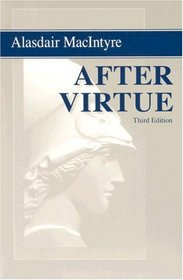Search -
After Virtue: A Study in Moral Theory, Third Edition
After Virtue A Study in Moral Theory Third Edition
Author:
"After Virtue is a striking work. It is clearly written and readable. The nonprofessional will find MacIntyre perspicuous and lively. He stands within the best modern traditions of writing on such matters." --New York Review of Books "MacIntyre's arguments deserve to be taken seriously by anybody who thinks that the mere... more »
Author:
"After Virtue is a striking work. It is clearly written and readable. The nonprofessional will find MacIntyre perspicuous and lively. He stands within the best modern traditions of writing on such matters." --New York Review of Books "MacIntyre's arguments deserve to be taken seriously by anybody who thinks that the mere... more »
ISBN-13: 9780268035044
ISBN-10: 0268035040
Publication Date: 3/1/2007
Pages: 312
Edition: 3rd
Rating: ?
ISBN-10: 0268035040
Publication Date: 3/1/2007
Pages: 312
Edition: 3rd
Rating: ?
0 stars, based on 0 rating
Publisher: University of Notre Dame Press
Book Type: Paperback
Members Wishing: 8
Reviews: Amazon | Write a Review
Book Type: Paperback
Members Wishing: 8
Reviews: Amazon | Write a Review
Genres:
- Nonfiction >> Philosophy >> Ethics & Morality
- Nonfiction >> Philosophy >> Modern
- Nonfiction >> Philosophy >> Religious




